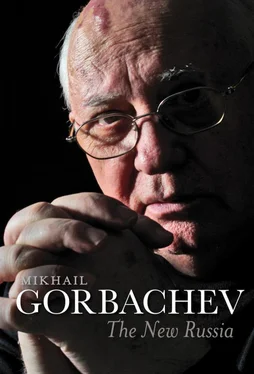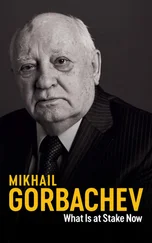Russia and the other republics of the former Soviet Union were entering an unknown future. What could they expect? A radical break had occurred in the life of the country and of tens of millions of people. Was there hope we could overcome the negative effects of the rash, unlawful decision to ‘disband’ the Soviet Union? That we could get on track to develop the economy along free market lines, and find new arrangements for nations that for centuries had been living in the same country to collaborate? I have to admit that at the time I had no answers to these questions. When I speculated about the future, my main feeling was disquiet, not for myself, but for the country and our people. I tried to remain optimistic.
In his New Year speech on television, the president of Russia said the coming year of 1992 would be different: ‘Our task is to lay the foundations for a new life. I have said before and will say again: we have a difficult time ahead, but it will not last long. We are talking about six to eight months.’ Did Yeltsin believe his own rhetoric? He was, of course, being advised that the difficulties would be overcome in miraculously short order, and was being plied by foreign experts with news of how beneficial the experience of ‘shock therapy’ had been in a number of countries in Eastern Europe, Latin America and elsewhere. What is certain is that neither Yeltsin nor Yegor Gaidar, to whose team he entrusted implementation of the economic reform programme, can have imagined that the promised six to eight months of economic discomfort would, for most of Russia’s population, drag on for many painful years. For almost 15 years Russia’s standard of living was to remain lower than in the Soviet year of 1990. In some years it was catastrophically lower, at half the level. [1] According to official figures from the Russian Federal State Statistics Service, the population’s real income returned to the level of 1990, the penultimate year of Perestroika, only at the end of 2005.
The Russian deputy prime minister, Yegor Gaidar, commenting on the ‘freeing’ of prices in the Russian Federation on 2 January 1992, stated in an interview for Russian journalists: ‘In the most favourable scenario, prices will increase in January and February by approximately 100 per cent in each month.’ In fact, the price of most basic goods immediately rose by 5–10 times compared with December 1991, and by 10–20 times compared with January 1991.
In early 1991, the minimum level of pensions and wages was stable, at 100 roubles, while the average salary was between 200 and 250 roubles. In early 1992, incomes of the lower paid rose by 350 per cent and that of those on middle incomes by 150–200 per cent. Against that, the price of bread went up by 1,000–1,500 per cent, milk by 1,500–2,000 per cent, butter and sour cream by 3,000 per cent, potatoes by 1,000–2,000 per cent in the shops and by 5,000–10,000 per cent in the markets.
The price shock of January 1992 had been preceded by a complete emptying of the shelves the previous December. Matches and salt had disappeared. Cereals and sugar were bought up by the sackful. A considerable contribution to this state of affairs was an announcement to the whole country by the president of the Russian Federation in October 1991 that he had decided in favour of ‘radical economic reform’. People realized this would inevitably result in price rises and rushed to stock up. In anticipation of higher prices, producers and trade organizations held back goods in their warehouses and distribution centres. As a result, expectations of inflation soared and in the final months of 1991 commercial activity was at a virtual standstill. Blame for the long hours of queueing and empty shelves was laid squarely on ‘Gorbachev’s Perestroika’. That was easy. It was less easy to blame Gorbachev for the fact that average consumption of foodstuffs in Yeltsin’s Russian Federation approached the corresponding level in the Soviet period only in the mid-2000s.
The price rises were painful in the extreme. As early as the first week of January 1992, the social and political situation in many Russian cities became tense and protest demonstrations broke out. President Yeltsin decided to travel to the Volga region to see, as he said, ‘at first hand the state of affairs in the provinces, how price liberalization is being implemented, and whether anything is being overdone’. Andrey Cherkizov, a journalist travelling with him, wrote: ‘The reform is causing distress. It is a harsh reform, with almost no accompanying safety net, a reform that is sailing very close to the wind.’ He saw this as explaining the president’s desire to ‘frantically find additional propaganda resources’. Instead of looking for ways to provide people with support and mitigate the impact of price increases, Yeltsin suddenly started talking about the Black Sea Fleet in Crimea and making remarks about not granting autonomous status to the Volga Germans. ‘First they started playing the Black Sea card, now it is the German card’, and all this delivered ‘in a steely tone of voice’. It seemed, Cherkizov concluded, that ‘the Yeltsin-Gaidar economic reforms need someone to confront’.
Indignation at rising prices was growing, but I believed it was best not to jump to conclusions. As I told the journalists who surrounded me at the entrance to the Foundation: ‘Eleven days into the start of price liberalization is too early to judge. I think the first priority for Russia’s leaders should be to de-monopolize production and mitigate the effect of price rises on the population.’
The search for a scapegoat, threats
With every passing day, however, it became clearer that Giulietto Chiesa had been right in anticipating that the new Russian government might start looking for a lightning conductor, or rather a scapegoat. Help came to them from a seemingly unlikely quarter. The leaders of the Communist opposition now thunderously proclaimed – as, until recently, the radical liberals had been doing – that the name of the ‘main and basic culprit of all the ills of Russia and the Russian people’ was, wait for it: ‘Mikhail Gorbachev’!
In Moscow the Russian Communist Workers Party, the Communist League, and Workers’ Russia called on people to demonstrate on Manezh Square against the ‘ridiculous’ free market, ‘ridiculous’ privatization and the collapse of the country and army, but loudest of all they called for Gorbachev to be put on trial. Here is how Den’ [ Day ], a newspaper edited by that longstanding opponent of Perestroika, Alexander Prokhanov, put it in a special issue:
The square demanded prosecution of this appalling man who has betrayed everybody. In accordance with the will of this most magnificent meeting in the world, people were chosen who have begun investigating the case against Gorbachev. Viktor Ilyukhin heads a commission which is already elucidating the role of the former general secretary and president in the unprecedented wilful destruction of the country in the interests of other powers, his foreign policy which has destroyed our allies and partners, and his domestic policy which has pushed crazed citizens to the brink of civil war.
I should mention here that the author of this literary gem is today an all but permanent fixture on the screens of the state television channels, appearing in the second decade of the twenty-first century as an active supporter and would-be ideologist of the current Russian government, developing a new ‘National Idea’. Many active in the United Russia Party are zealous disciples of Prokhanov and have taken up not only his anti-Gorbachev rhetoric but also the threats directed at my person.
These were first heard in early 1992. The Moscow Organizational Bureau of the Russian Communist Workers Party appealed to the Supreme Soviet and the forthcoming Congress of People’s Deputies to
Читать дальше












